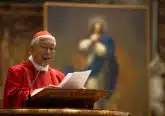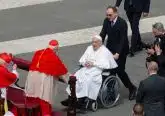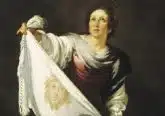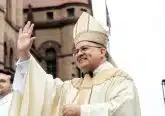a Global Perspective: A Conversation With the Apostolic Nuncio, ARCHBISHOP CHRISTOPHE PIERRE
by Jessica Rinaudo
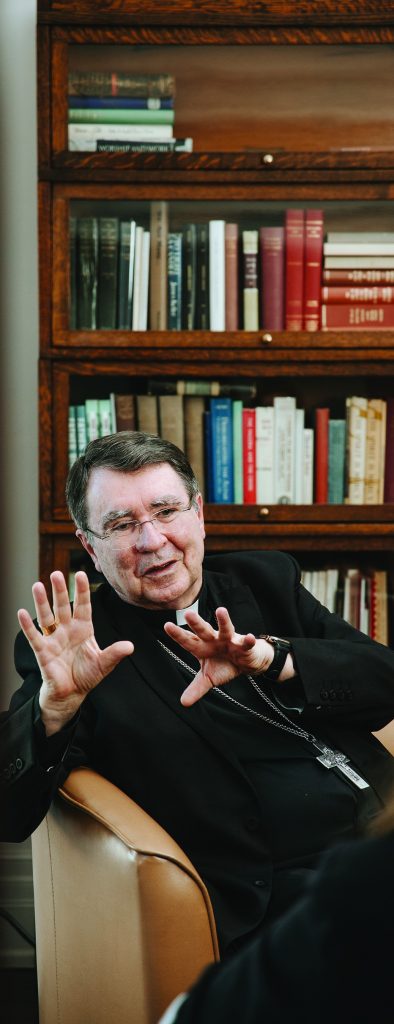 It’s not every day that the apostolic nuncio, the Vatican’s ambassador to the U.S., visits Cincinnati. But in November, Father Earl Fernandes, his former assistant at the nunciature, invited him to make the trip to Southwestern Ohio from Washington, D.C. During his visit, Archbishop Christophe Pierre took the opportunity to bless St. Ignatius School, confirm youth at the Cathedral Basilica of St. Peter in Chains, meet with Archbishop Schnurr and sit down with the The Catholic Telegraph team to talk about a wide range of topics.
It’s not every day that the apostolic nuncio, the Vatican’s ambassador to the U.S., visits Cincinnati. But in November, Father Earl Fernandes, his former assistant at the nunciature, invited him to make the trip to Southwestern Ohio from Washington, D.C. During his visit, Archbishop Christophe Pierre took the opportunity to bless St. Ignatius School, confirm youth at the Cathedral Basilica of St. Peter in Chains, meet with Archbishop Schnurr and sit down with the The Catholic Telegraph team to talk about a wide range of topics.
WHAT IS A NUNCIO?
First, Archbishop Pierre explained what, exactly, a papal nuncio is and how he fulfills that role in the U.S. First and foremost, he serves as the representative of the Holy Father to the American government, the bishops and the entirety of the Catholic faithful within the U.S.
“My work is to … help the pope to understand what’s going on, and also helping the bishops and the local Church to understand what the pope wants,” said Archbishop Pierre. “We are also representing the Holy See with the government. … Whatever problems we have with the United States to Rome. It’s a kind of go-between, like most of the embassies.”
The nuncio’s office is also responsible for aiding the pope with appointments of new bishops within the U.S. The process is a lengthy one that involves extensive research, recommendations and approvals. Archbishop Pierre said that’s one of his primary responsibilities, adding, “We try to accelerate the movement. At times, it works; at times, it doesn’t work. Our concern is to do a good job. We don’t want to make a mistake.”
The role of apostolic nuncio is a big one and carries heavy responsibilities. His path to the prestigious position was not one he ever planned to take, though.
“I wanted to become a priest in my home diocese. And at the end of seminary, my bishop called me and [said] he would like to send me to Rome and to serve the Holy Father. So I was first surprised,” said Archbishop Pierre. “The Vatican has a school for preparation of the future diplomats of the Church. We receive a training for this job… For four years, I studied in Rome, and, eventually, once you are admitted to the service, you start your job.”
And while the role of Vatican diplomat may not have been one Archbishop Pierre originally imagined for himself, it quickly became clear he was meant for it. “I began to go around the world 43 years ago, and I’m still going around. And I’ve been in nine countries for the last 43 years. It has been a very interesting life. I don’t regret saying ‘yes,’” he said.
THE GLOBAL CHURCH
With decades of experience under his belt, Archbishop Pierre has a unique and global perspective on the Catholic Church.
“If you have the mentality of a pastor, you can be a pastor anywhere,” he said. “During my life, I have had so many opportunities to be in touch with local churches in poor countries, in missionary countries, like Mozambique, Zimbabwe, Cuba, Haiti, Uganda. That’s where I spent my life. So I’ve been in contact with a lot of local churches, close to the poor people in situations of war and misery. I have learned a lot. If you want to be involved, you are involved.”
Additionally, the archbishop has been in the service of four popes. But, in his opinion, the best analysis of the global climate of the Church today comes from the documents of Pope Francis.
“[Pope Francis] has such depth and vision of what’s going on in the world. And what’s going on is basically kind of a new epoch, a new moment [that] is in line with post-modernity, a kind of fragmentation of society,” said Archbishop Pierre.
“This new moment creates a crisis of transmission of values between one generation to another. Before, the transmission was made through the society, the church, the school, but it seems that the parents today have a great difficulty to transmit what they want to their children. The same with the teachers, the same with the politicians, the same with the priests. We are all lost,” said the archbishop.
“Because they are lost, the receivers, the children, the young people, are not convinced,” the archbishop continued. “They will be convinced if we are to witness, and if we live what we believe. We don’t actually live fully what we believe, [so] we are not credible. And this is a crisis of this society.”
POPE FRANCIS & FRATELLI TUTTI
While Archbishop Pierre discussed a number of Pope Francis’ encyclicals, he honed in on his most recent document, Fratelli Tutti, subtitled, On Fraternity and Social Friendship. To fully understand the value of its content, “we have to understand it in line with what the pope has said over the last seven years,” he said.
“The human fraternity, which is a value, according to the pope, but also to many people today, is very much needed in a world which is divided, which is fragmented, where there are counter – positions, like what we have today in the United States. We have seen that in the occasion of this electoral campaign. That we are unable to talk to one another. If we are unable to talk to one another, what kind of society will we be?” Archbishop Pierre asked.
“[Pope Francis] gets his vision from his own faith. If we are really believers in Christ, if we are disciples of Jesus – and you’ll find a lot of beautiful mentions of that – we should work for fraternity,” he said.
A great admirer of Pope Francis, Archbishop Pierre asks that Americans take the time to get to know him.
“The Holy Father is not perfect, but he has been chosen by the Holy Spirit! … If you know him, you will know his defects, but you will also know his qualities. A lot of people today have not made the effort to know who [the pope is]. He comes from a different culture, a different country, but he also brings – and that’s the providence of God – his qualities, his experience, for the whole Church,” Archbishop Pierre said.
He continued, “And I can tell you, because Providence called me also to work in four countries in South America; so, for many years now, I have known Pope Francis, and seen his work and his background. I understand his motivations. I admire him a lot. And I’m convinced that Providence is working. And thank God for that!”
EVANGELIZATION
Throughout the interview Archbishop Pierre reiterated the crucial need for evangelization in modern culture across the globe.
“The secularization [of the world] is so deep that we are all affected by that. What can we do to continue to evangelize? Because this is our work. It’s not just to organize things.
… We have wonderful parishes, well organized, beautiful schools. We are quite good in organizing, but are we really evangelizing?
… Are we reaching the young people where they are? Are we really helping the young people today to understand their own life? To discover the beauty of their life and to relate it to their faith in God? What does it mean today to have faith? To me, this is the real challenge,” he said.
Archbishop Pierre closed our interview with a series of challenging questions for the Catholic faithful in America: “Have we really met the Lord? What has been in your life to meet Him well? Has this encounter had an impact? Has this encounter just opened you to a whole new reason for life? What are you doing with this encounter? Have you already forgotten it? Has it not impacted, and it’s business as usual?”
These, the archbishop said, are essential for us to answer before we can begin to effectively evangelize the world around us.
This article appeared in the January 2021 edition of The Catholic Telegraph Magazine. For your complimentary subscription, click here.
Part I Interview:
Part II Interview:
Part III Interview










